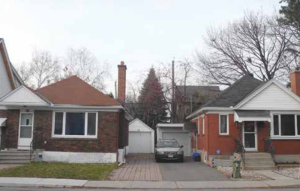Dianne Caldbick

Bill 23 will allow three dwelling units on any lot, so that these two McNaughton Avenue houses could be replaced “as of right” with new structures that have a total of six units.
In mid-November, the Old Ottawa East Community Association (OOECA) wrote to the Government of Ontario and the Ontario Legislature’s Standing Committee on Heritage, Infrastructure and Cultural Policy to protest the government’s proposed Bill 23, the More Homes Built Faster Act, 2022.
While acknowledging the need to house Ontario’s growing population and address the challenge of affordability, OOECA called for a re-think of the Bill to ensure that local residents have a voice in shaping our communities, that environmental safeguards are protected, and that ‘growth pays for growth’.
“We had to step up to protest this Bill,” says OOECA President Bob Gordon, “because it stifles local voices and gives too much influence and power to developers.”
The City of Ottawa’s planning and development policies and parameters — outlined in the Official Plan, Zoning By-laws, and community-level plans such as the OOE Secondary Plan — have long been the result of consultations and collaboration between the City and interested citizens and groups, including OOECA and other community associations.
This consultative process has allowed Ottawa residents to help shape the built and natural character of our communities and neighbourhoods. Bill 23 limits the City’s latitude to establish planning and development policies specific to the Ottawa context, and it denies citizens the right to appeal planning and development decisions that affect them.
In so doing, Gordon says, “the Bill will make it much more difficult for local groups such as OOECA to help shape the fabric of our communities and to ensure respect for the built heritage and character of our Old Ottawa East neighbourhoods.”
John Dance, Chair of OOECA’s Planning Committee, echoes Gordon’s concern: “The way that new housing and developments relate to existing neighbourhoods and to the public realm is a subject of legitimate interest to all in the community, given their impact on livability and well-being. As local residents, we should not be denied the right to influence decisions around issues such as community design, site design, sustainable design, and landscapes, and to appeal decisions that do not meet our needs and interests.”
In its correspondence, OOECA also echoed the concerns of environmental groups about Bill 23’s reduced oversight of the environmental impacts of development. Like others, OOECA decried proposed measures such as gutting the role of Ontario’s 36 regional conservation authorities, limiting municipalities’ ability to promote green building standards, and reducing parkland requirements for new developments.
Experts warn that these measures will increase the risks of flooding, erosion and drought, while contributing to more greenhouse gas emissions and reducing residents’ access to green space. Gordon notes, “Bill 23’s attack on environmental standards is regressive and short-sighted, at a time when we need bold action to address the climate crisis and the increasing threats to natural habitats and biodiversity.”
In its correspondence, OOECA also took issue with the Bill’s provisions to discount some and outrightly eliminate other development charges. This will shift the financial burden of infrastructure and services for new developments from developers to the City of Ottawa.
Dance notes, “What this means in practice is that either property taxes for existing homeowners will increase substantially, or the quality and reliability of municipal amenities and benefits for new communities will suffer. The new Bill will force one or both of these outcomes, while providing no guarantees that developers will pass their savings on to new home buyers and renters.”
OOECA will continue to engage with the provincial government and work with Ottawa City Council and staff and Capital Ward Councillor Shawn Menard to fight for more time for substantive public consultation on Bill 23 and for major amendments to its provisions to address issues of concern.
Old Ottawa East residents can find OOECA’s submission to the Standing Committee, as well as letters from other concerned groups, on Councillor Menard’s website, at the following link: https://www.shawnmenard.ca/ stopbill23.
Editor’s Note: Dianne Caldbick is a member of the Old Ottawa East Community Association’s Planning Committee. On November 28th, the Ford government passed Bill 23 into law, with minor amendments. The Mainstreeter will continue to analyze this issue and report to residents on the new law’s implications for Old Ottawa East






